The Chinese goose is known for its lean meat quality. They are also known for having less oil compared to other domestic goose breeds.
Additionally, they are known for their egg production capabilities, as it can lay up to 100 eggs in one season. They produce large, white eggs, which are roughly equal to 2 to 3 chicken or duck eggs.
You can have them fried or boiled, as well as incorporated into baking cookies, cakes, confectionery products, and other bakery products. However, the taste depends on consumer preferences as they can be stronger compared to chicken or duck eggs.
To know more about the Chinese goose, its history, physical attributes, distinctive characteristics, uses, egg-laying capabilities, market price, and other interesting and relevant information, simply read further this article!
Chinese Goose History
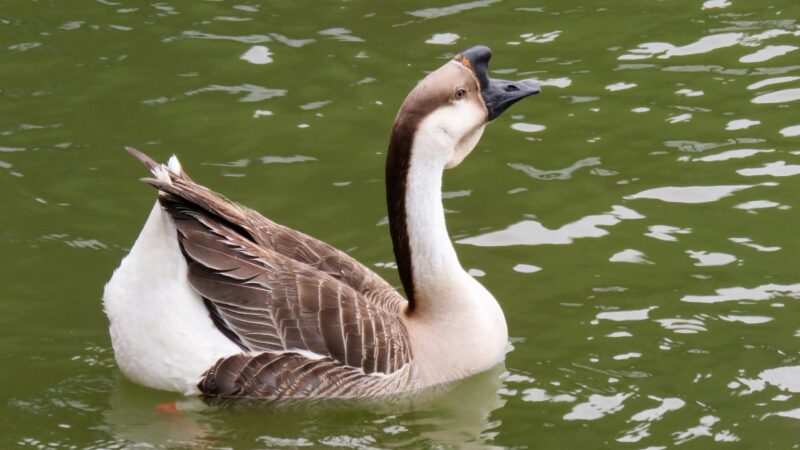
The Chinese goose is often mistaken for the Swan goose, but the two are completely different. The former is a breed of domestic goose, while the latter is an entire species of goose with the scientific name Anser cygnoides.
It is believed that Chinese geese, along with African geese, have no exact point of origin and that both descended from the Asiatic Swan geese.
Chinese geese were observed in Britain in the early 18th century and were present in North America during the colonial period. But it wasn’t until 1874 that the White Chinese goose and Brown Chinese goose was officially recognized by the American Poultry Association as conforming to their standard of perfection.
In 1876, Chinese geese were introduced in the Centennial International Exhibition as Chinese Swans, although they are different animals.
Chinese Goose Identification
What Do Chinese Geese Look Like?
Chinese geese have a well-rounded, curvaceous but short body with a moderately full abdomen, a long and slender neck (much like a swan’s) that they usually arch at a 45-degree angle, a thin and relatively long beak, a large and erect knob placed on its forehead, and no keel.
Chinese geese have two color varieties:
- Brown Chinese geese are a rich fawn and brown color with dark russet-brown accents, a band of creamy white on the portion between the knob and the main head, a black beak, brownish or dark orange feet and shanks, and brown eyes.
- White Chinese geese have an overall white plumage with blue eyes and bright orange knobs, feet, and beaks.
How Long Does a Chinese Goose Live?
Chinese geese can live for around 10 to 15 years in captivity, the same lifespan as their close relatives, the African geese. Both geese, along with the Embden geese, are among the longest-living breeds of goose.
What Do Chinese Geese Eat?
Grasses and plant material such as sedges, seeds, berries, roots, and leaves. They also consume grains such as corn, wheat, and oats.
Chinese geese are referred to as Weeder geese since farmers and gardeners use them to control weed populations.
How Big Do Chinese Geese Grow?
Chinese geese have a body length of 37.9 to 45 centimeters, a height of 69.1 to 83.1 centimeters, and a chest width of 21.3 to 24 centimeters.
Are Chinese Geese a Heavy Breed?
Chinese geese are heavier than they may appear, with mature ganders or male geese weighing 4.5 to 5.4 kilograms and female geese weighing 3.6 to 4.5 kilograms. They have closely fitted feathers, which give the impression that they may be a lighter breed.
Chinese Goose Wingspan
Chinese geese have a length of 160 to 185 centimeters, which is a similar measurement to their assumed parent goose species, the Swan goose.
What Is Chinese Goose Known For?
- Eggs. They are primarily used for egg production as they can lay 40 to 100 eggs per clutch a year so long as they are managed well. With this number, they produce nearly twice as much as other breeds. Chinese geese are also crossbred with Embden geese for increased egg production.
- Meat. Chinese geese can produce the least greasy meat among other breeds, which makes them easier to cook as there will be less fat to render out.
- Guard Animals. These geese don’t even need training as once they have established their territory, they will defend it aggressively and alert their owners should any intruders arrive, making them ideal guard animals. In fact, in China, police use geese to stand guard at their respective stations.
- Weeding. Since geese are active foragers and eat a variety of grasses and herbaceous plants, they can be utilized as weeders and control weed populations growing on crops.
Where Do Chinese Geese Originate?
It is unknown where the Chinese goose came from. The only information we have on their origins is that they have most likely descended from the Swan goose, along with the African geese.
What Are the Distinct Characteristics of a Chinese Goose?
Chinese geese are revered for their active foraging capabilities, agility, and moderate size. They are also alert as they have great sight and hearing. Despite being a highly vocal breed, they will honk loudly if they perceive any threat.
When Do Chinese Geese Lay Eggs?
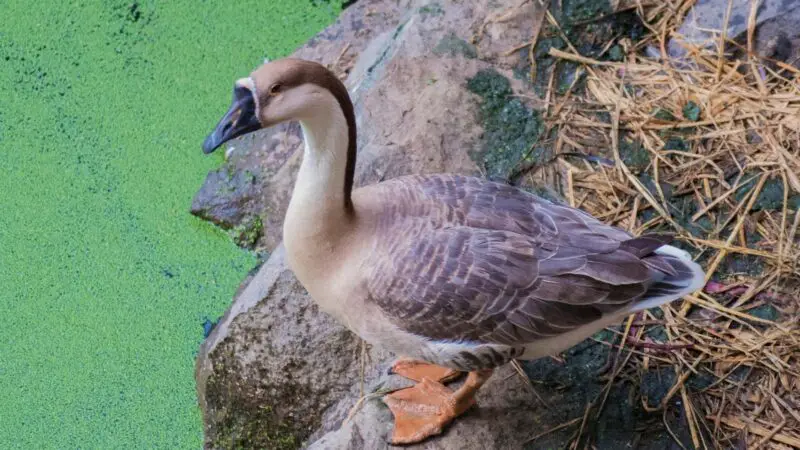
The main egg-laying period for Chinese geese is during the spring, around mid-February to May, but commercial egg producers usually encourage early seasonal production during the winter season so that the goslings are of marketable weight and age just in time for the next season.
How Old Is a Goose When It Starts Laying Eggs?
Goslings don’t usually come into egg laying until they are 9 months to 1 year of age, but the typical age of maturity is at 2 years. Regardless of sex, goslings usually give the best results in breeding and egg production when they are around 2 to 5 years old.
Although good fertility can be obtained from goslings, these eggs have a chance of not hatching well. It may also adversely affect their egg-producing performance during the following years of their life.
Geese can be used for breeding until they are 10 years old. However, ganders should be culled once they turn 6 years old. Usually, breeders replace birds after about only 4 breeding seasons since this is usually the time reproductive performance declines significantly.
How Often Do Chinese Geese Lay Eggs?
Like all geese, Chinese geese undergo one laying cycle a year. Hence, they are only able to produce eggs once a year.
What Color Are Chinese Goose Eggs?
Chinese geese can produce large, white eggs, but they can also be brownish or grayish.
Are Chinese Goose Eggs Good to Eat?
Chinese goose eggs are good to eat, but the flavor might be stronger compared to chicken and duck eggs. It all depends on the preferences of the consumer.
One good thing about them is that they are large, equating to about 2 to 3 chicken or duck eggs. They can be fried and boiled, as well as incorporated into baking cookies, cakes, confectionery products, and other bakery goods due to their oiliness.
Do Chinese Geese Go Broody?
Chinese geese go broody. Like most geese, they exhibit broody behavior while incubating their eggs up until they hatch. They will show an overall nervous temperament. If a predator approaches, it will hiss and flap its wings at them.
How to Tell Male From Female Chinese Geese?
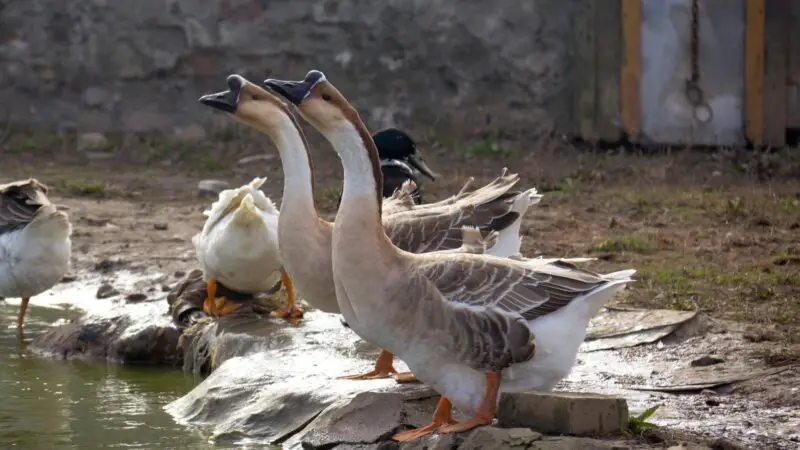
Like all geese, ganders will usually be bigger than female geese and are more “regal-looking” since they stand more upright, still maintaining a 45-degree arch, with their beak also pointed upwards.
Females adopt a more relaxed stance as they point their heads slightly downwards but still gracefully arch their necks.
Another difference is that ganders will have a small projection that serves as a reproductive organ found in their cloaca; females do not have this feature.
Are Chinese Geese Good Pets?
Chinese geese are good pets, but you have to train them to be docile around other humans since they are an initially aggressive breed. Despite being low-maintenance animals, they must still be well-taken care of.
This is done by providing them with adequate foraging space and a swimming area. Unfortunately, they make too much noise and can become a nuisance, especially when you’re in a residential community.
Can You Eat a Chinese Goose?
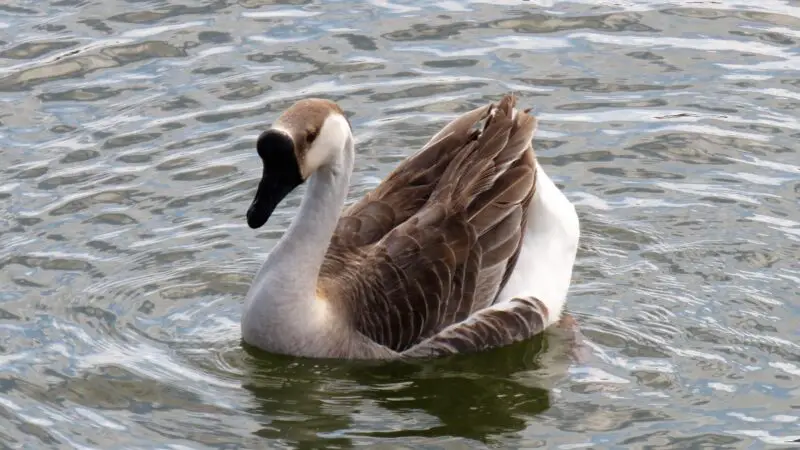
You can eat a Chinese goose. Roasting Chinese geese is the most popular way of eating them, and the flavor of which has been deemed delicious by most consumers.
Do Chinese Geese Fly?
Chinese geese do fly if they are given room to have a running start. They won’t be able to fly just by standing. It is important to note that they don’t have good maneuverability when airborne and could only cover a small distance. Since they are domestic geese, they don’t migrate.
How Much Does a Chinese Goose Cost?
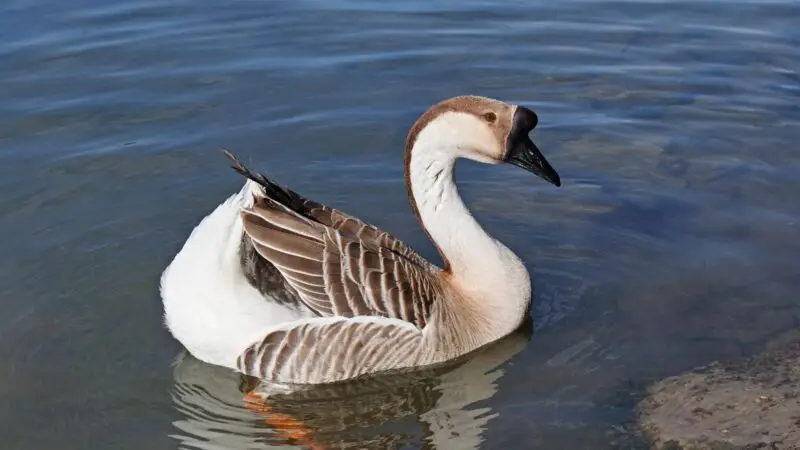
As of this writing, Brown Chinese geese cost around $15.89 to $23.09 for unsexed goslings, $14.50 to $18.25 for males, and $26.78 to $37.61 for females.
On the other hand, White Chinese geese cost around $11.46 to $17.05 for unsexed goslings, $8.91 to $13.65 for males, and $19.09 to $27.21 for females.
Are Chinese Geese Loud?
Chinese geese are loud enough to be used as alarms when an intruder enters your premises. Like most geese, they make a honking sound.
How to Raise Chinese Geese?
Before raising geese, know what you’re using them for. If raised for meat production, consider constructing confinement houses to increase the number of geese you can have in a single living space. For raising geese as pets, incorporate grass floors and fencing around their houses.
Make sure their living quarters have enough shelter to shade them during hot seasons. Provide them with a swimming area and easy access to water by constructing a pool or pond. It must be well-sanitated to prevent the emergence of diseases and infections.
When purchasing or adopting geese, make sure to choose at least two or three of them, as they live better when they are socially interacting with other geese.
Feed Chinese geese with grass, grains, and herbaceous plants. You can also opt for commercially available goose diets but make sure they are complete in essential nutrients.
What Is the Difference Between Chinese Geese and African Geese?
African geese are significantly larger in size and heavier in weight, too. They also have a dewlap that hangs from their lower jaw and has a more prominent knob.
Moreover, they are completely unable to fly, are relatively less territorial, and are poor egg layers compared to Chinese geese.
Chinese geese are domestic goose breeds known for their meat quality, egg production capabilities, and effective roles as guard animals and weed population controllers.
They are characterized by their active foraging ability, agility, and moderate size. Like the African geese, Chinese geese have descended from the wild Asiatic Swan goose.
List of Sources
Chapter 4 – Guinea Fowl, Goose, Turkey, Ostrich, and Emu Eggs
